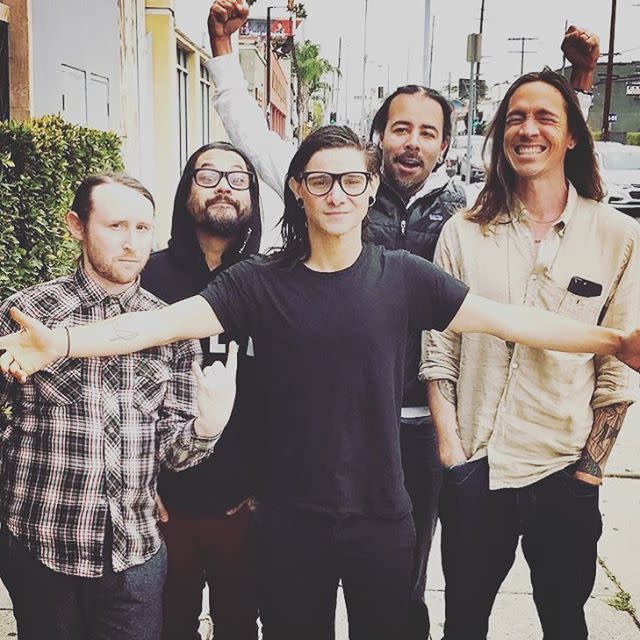Brandon Boyd on Heartache, Breakups, Skrillex, and New Incubus Album ‘8’

additional reporting by Monica Molinaro
“Love is something that is continually inspiring to me, but also continually frustrating and elusive,” muses Incubus frontman Brandon Boyd. “It’s like love is like the proverbial soap bar in the shower: ‘I got it,’ slips out from in between your fingers.”
When we speak, Boyd is very candid about the fact that his band’s superb new album, 8, was in part influenced by the end of a long-term romance. “I was in a relationship for the better part of 10 years, and the relationship shifted where we’re not a traditional couple anymore,” he says. “We went back into a place where we’re remaining platonic friends, which is where we started. But that is a tough transition, no matter who you are.”
Understandably, that transition permeated the lyrics of 8. “It seemed to coincide with the writing of this album, and so there are these moments where emotionally I was a wreck coming into the studio. But then I don’t know if Mikey [Einziger, guitarist] could pick up on that stuff: ‘Wow, you’re a wreck now — let’s write a song,’” Boyd adds with a laugh.
The result is an explosive, tension-filled album that is one of the best of the band’s quarter-century career. 8 is laden with strong riffs and hooks, which Boyd also credits greatly to Einziger and bassist Ben Kenney. “I have to say that Mikey and Ben also came into full Mikey-and-Ben formation when we were writing this,” he says. “They just got interested in big dirty, grimy riffs again, which is really exciting for me as someone who loves to write rock songs among other kinds of songs.”
While 8 is a traditional rock record, Incubus did branch out on “Familiar Faces,” which features the presence and work of Skrillex, a longtime fan and friend of the band.

“Skrillex mixed it and cued it and sprinkled his magical alien dust on it, as he does so effortlessly,” Boyd says. “It was so much fun being around him. He came to the studio just to listen to some songs; we were finishing some mixes and Sonny [Skrillex] is in the room and he very nonchalantly was like, ‘What’s the name of that song right there?’ Then he looks at Dave [Massey, from the label] and he goes, ‘Would it be weird if I took the stems in the other room and just f***ed around with that?’ We look at Dave, like, ‘Give him the stems!’”
Although Boyd and Skrillex are friends, the Incubus frontman was still blown away by what Skrillex did with “Familiar Faces.” “He went in a separate studio for an hour and a half, two hours tops, and I went down there and I was like, ‘What the f***? How do you work so fast?’” Boyd says in amazement. “It seems to be the ethos. He obviously has a pretty massive work ethic, but it looks like he is really enjoying himself the whole time. So I’m not surprised he’s as prolific as he is, because you mix an amazing work ethic with that kind of ‘I’m gonna do it ‘cause it’s fun’ thing, and then you’re Sonny.”
For the best representation of the sonic ferociousness of the album as a whole, though, one can look at the forceful and catchy first single, “Nimble Bastard.” We had to ask Boyd for an example of what a nimble bastard really is.
“I grew up with people like this, and there were moments in the song where I was loosely referring to personal experiences,” he says. “But then there are moments in the song too where it’s sort of generally speaking about an idea of adaptability I suppose, and adaptability under very strange or very threatening circumstances. There are people that have this natural ability to f*** up over and over again, and then somehow come back a little bit stronger each time.”
As for the title phrase, Boyd says, “So there was definitely this stream-of-consciousness ethos at play with writing the lyric to this song. It almost had like a British accent. Somebody somewhere in England is saying, ‘Oh, you’re a nimble bastard, ain’t you?’ So that’s how that kind of term snuck its way into the lyric.”
For Boyd, writing the new album was a release for him. “It’s the closest thing to a catharsis or therapy. It’s how I know how to most successfully see myself, through art,” he says. “That’s why I paint too, because I have internal turmoil that I believe all people do. Human beings are complex animals and we have language as our most tried-and-true and agreed-upon mode of expressing those things. I’ve always found mere language to be very limiting, linear language. So I allow myself to go there, because I feel like I need to in order to understand what is happening in transitions in my life and dynamic moments of my life.”
Now 41 years old and celebrating 25 years with his Incubus bandmates, Boyd has a great appreciation and understanding for how fortunate the band is to have the dedicated following they enjoy.
“I feel very, very lucky to have the opportunity to do what I need to do and also do what I like to do,” he says. “And then occasionally there are groups of people that are like, ‘I like that, do that again.’ It’s an unusual circumstance, but it’s one that I don’t take for granted. I feel very blessed to have the opportunity to do what we continue to get to do.”
It’s especially true for him in 2017, when the role of rock in pop culture has changed so dramatically. “We live in this time of incredible technologies where any person can go into a recording studio and go, ‘Ah, ah’ into a microphone and a producer can turn that into a hit song,” Boyd says. “There’s something fascinating about that, but there’s also something that’s lost in that, where we have to remind ourselves sometimes we’re human beings with instruments and we’re making sounds out of nothing. So it’s kind of interesting to be a rock ‘n’ roll band in this day and age, where you can make any band sound any way you want to. Incubus has become decidedly old-school in certain ways, where we actually want that grime and humanity to push through in the music. What we’re looking for is grit and art and good ideas — and hopefully, once again, innovation.”

